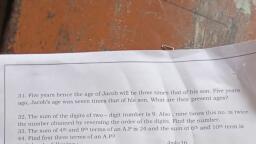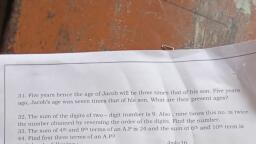Question 2 :
For the expression $ax^2 + 7x + 2$ to be quadratic, the necessary condition is<br>
Question 3 :
The discriminant of $x^2 - 3x + k = 0$ is 1 then the value of $k = .............$
Question 4 :
If, in the expression $x^2 - 3$, x increases or decreases by a positive amount a, the expression changes by an amount
Question 5 :
Check whether the given equation is a quadratic equation or not.<br/>$\quad { x }^{ 2 }+\cfrac { 1 }{ { x }^{ 2 } } =2\quad $<br/>
Question 6 :
Say true or false.If $2y^{2}\, =\, 12\, -\, 5y$, then solution is $\displaystyle \frac{3}{2}\, or\, -4$.<br/>
Question 7 :
Roots of the equation $\sqrt {\dfrac {x}{1-x}}+\sqrt {\dfrac {1-x}{x}}=2\dfrac {1}{6}$ are
Question 9 :
If $x^2-36=0$, which of the following could be a value of $x$?
Question 10 :
The following equation is a qudratic equation. $16x^2 \, - \, 3 \, = \, (2x \, + \, 5)(5x \, - \, 3)$
Question 11 :
Think of a positive number, say $x$. From the square of this number, subtract three times of itself. If the result is $10$, then $x$ is equal to
Question 13 :
If $'r'$ and $'s'$ are the roots of the equation $ax^2+bc+c=0$, then the value of $\displaystyle\frac{1}{r^2}+\frac{1}{s^2}$ is equal to
Question 14 :
Find the discriminant of the equation and the nature of roots. Also find the roots.$2x^2 + 5 \sqrt 3x + 6 =0$
Question 15 :
I. lf one root of the equation $5x^{2}+13x+k=0$ is the reciprocal of the other, then $k=5$<br>II. lf the roots of the equation $a(b-c)x^{2}+b(c-a)x+c(a-b)=0$ are equal, then $a, b,c$ are in H.P.<br>Which of the above statement is true?<br>
Question 16 :
The roots of the equation $ax^2 + bx + c = 0$ will be imaginary if
Question 17 :
Does there exist a quadratic equation whose coefficients are all distinct irrationals but both the roots are rationals? Why?<br><br>
Question 19 :
The roots of the equation $(b+c)x^2-(a+b+c)x+a=0$ $(a,b,c\ \epsilon \Q, b+c \neq a)$ are
Question 20 :
Which of the following is correct, if the roots of quadratic equation are equal?


























